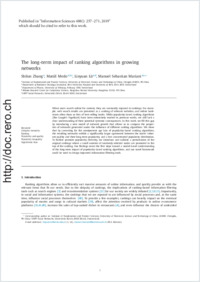The long-term impact of ranking algorithms in growing networks
- Zhang, Shilun Institute of Fundamental and Frontier Sciences, University of Electronic Science and Technology of China, Chengdu, China
- Medo, Matúš Institute of Fundamental and Frontier Sciences, University of Electronic Science and Technology of China, Chengdu, China - Department of Radiation Oncology, Inselspital, Bern University Hospital and University of Bern, Switzerland - Department of Physics, University of Fribourg, Switzerland
- Lü, Linyuan Institute of Fundamental and Frontier Sciences, University of Electronic Science and Technology of China, Chengdu, China - Alibaba Research Center for Complexity Sciences, Hangzhou Normal University, Hangzhou, China
- Mariani, Manuel Sebastian Institute of Fundamental and Frontier Sciences, University of Electronic Science and Technology of China, Chengdu, China - URPP Social Networks, Universität Zürich, Switzerland
-
01.07.2019
Published in:
- Information Sciences. - 2019, vol. 488, p. 257–271
English
When users search online for content, they are constantly exposed to rankings. For example, web search results are presented as a ranking of relevant websites, and online bookstores often show us lists of best-selling books. While popularity-based ranking algorithms (like Google’s PageRank) have been extensively studied in previous works, we still lack a clear understanding of their potential systemic consequences. In this work, we fill this gap by introducing a new model of network growth that allows us to compare the properties of networks generated under the influence of different ranking algorithms. We show that by correcting for the omnipresent age bias of popularity-based ranking algorithms, the resulting networks exhibit a significantly larger agreement between the nodes’ inherent quality and their long-term popularity, and a less concentrated popularity distribution. To further promote popularity diversity, we introduce and validate a perturbation of the original rankings where a small number of randomly-selected nodes are promoted to the top of the ranking. Our findings move the first steps toward a model-based understanding of the long-term impact of popularity-based ranking algorithms, and our novel framework could be used to design improved information filtering tools.
- Faculty
- Faculté des sciences et de médecine
- Department
- Département de Physique
- Language
-
- English
- Classification
- Physics
- License
- License undefined
- Identifiers
-
- RERO DOC 326791
- DOI 10.1016/j.ins.2019.03.021
- Persistent URL
- https://folia.unifr.ch/unifr/documents/308040
Statistics
Document views: 101
File downloads:
- med_lti.pdf: 214
